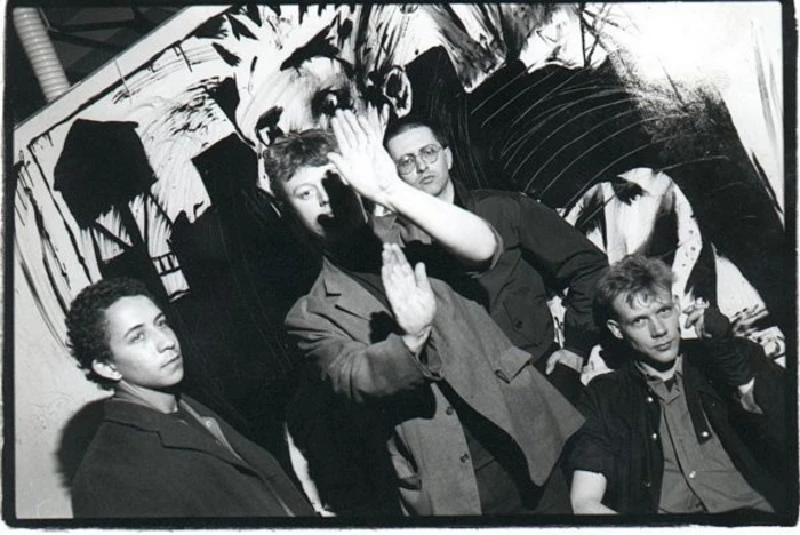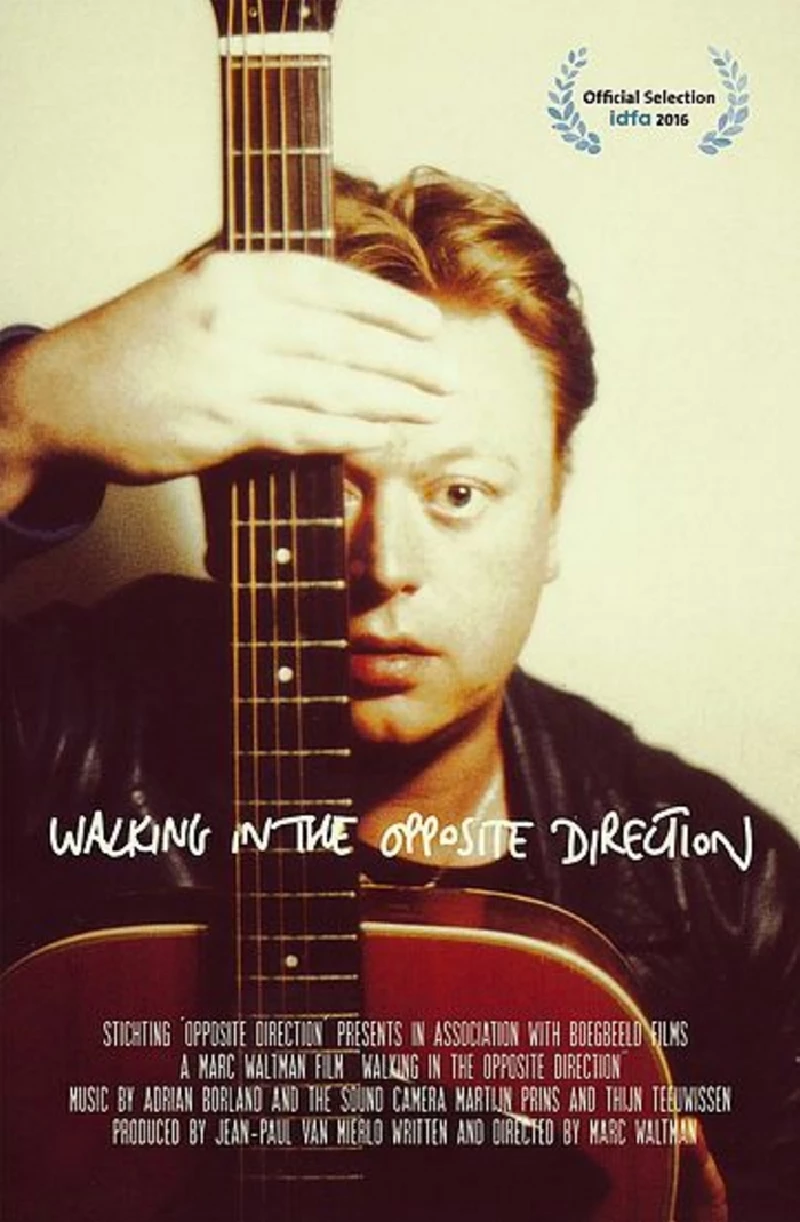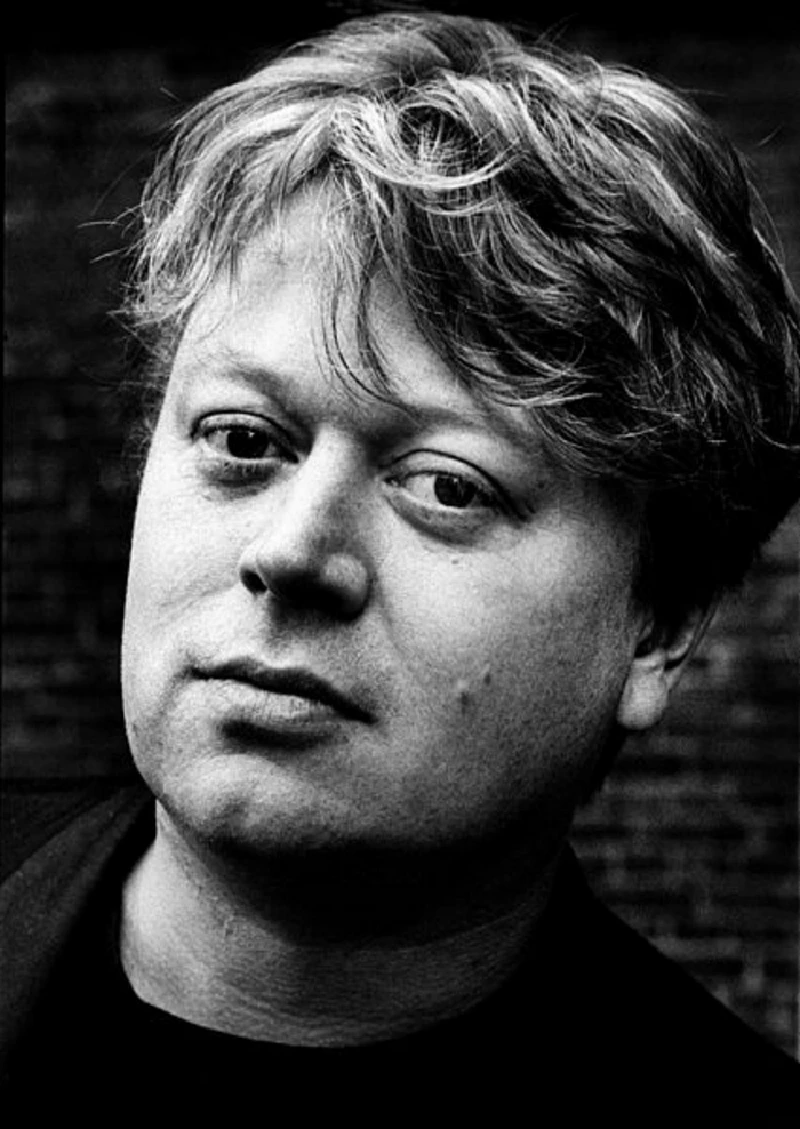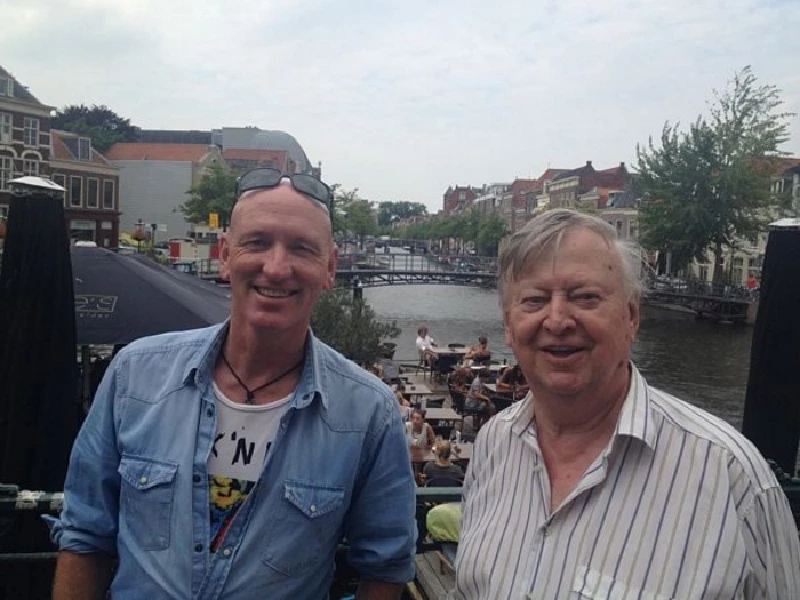Jean-Paul van Mierlo - Interview
by John Clarkson
published: 22 / 12 / 2016

intro
John Clarkson speaks to Jean-Paul van Mierlo, the producer of 'Walking in the Opposite Direction', a new documentary film about The Sound's frontman Adrian Borland
On the 26th April 1999 Adrian Borland, the former frontman with The Sound, was killed when he threw himself in front of a train at Wimbledon Station in South London. Borland had a schizoid-affective disorder, and at times he would have manic depressive episodes and suffer from hallucinations and paranoia. He had attempted to kill himself many times before. 'Walking in the Opposite Direction' is a new documentary film about Adrian's Borland's life and death. It was made by two Dutchmen, Sound fan Jean-Paul van Mierlo, who produced and researched it, and his friend Marc Waltman, who, as well as directing it, also wrote it and edited the film. ‘Walking in the Opposite Direction’ starts as it ends in Wimbledon, where Borland was raised and to where he returned to his middle class parents’ house to live in the final few months before he died. It finds him as a musically-obsessed teenager, in thrall of Bowie and Iggy Pop and the Stooges, forming in 1977 his first band, a punk group called the Outsiders. The Outsiders release the first self-released punk record, their debut album, ‘Calling on Youth’, later that year, which is recorded in the Borlands’ front room with Adrian’s father Bob serving as the engineer. By 1979 the Outsiders have mutated into The Sound, which as well as Borland (vocals, guitar) also features ex-Outsider Graham Bailey (bass), Bi Marshall (keyboards, saxophone) and Michael Dudley (drums). They sign to Korova, an ‘indie’ offshoot of EMI which also has on its roster Echo &The Bunnymen with whom they subsequently tour, and they release to great critical acclaim and moderate sales two new wave/early post-punk albums, 1980’s ‘Jeopardy’ (after which Marshall is unfairly fired and replaced by Max Mayers) and 1981’s ‘From the Lion’s Mouth’. The Sound's uncommercial third album ‘All Fall Down’ (1982) is less well-received by both the critics and the public, and they are dropped by Korova. Adrian also starts to show signs of mental illness, which he first manages to hide from his band mates, despite at one point being briefly sectioned. Then, however, he has a psychotic episode on a European tour, leading to its cancellation. After this he goes through an escalating string of other manic periods, which eventually lead to The Sound’s break-up in early 1988. In the early 1990s, Borland moves to the Netherlands, where he has always been more successful in his musical career than Britain and releases a succession of low-key solo albums, including 1992’s ‘Brittle Heaven’, which, despite him being on day release from a Dutch mental hospital for much of the time he was writing and recording it, took as its muse his then Dutch girlfriend Resi van der Ploeg and featured some of his most optimistic, uplifting songs. By 1999 Borland had returned to Britain and begins work on his fifth solo album, ‘Harmony and Destruction’, which is produced by American Wally Brill. He, however, decides to take himself off his anti-depressive medication as he believes it is affecting his creativity, and it has tragic results… There is a tendency in music documentaries for filmmakers to over-romanticise their protagonists when they have died young, but ‘Walking in the Opposite Direction’ avoids this trap. The early segments of the film captures well the optimism of the young Outsiders (which included Pennyblackmusic’s own Adrian Janes on drums) as they set about home-recording ‘Calling on Youth’. Elsewhere the Citizens, his Dutch backing band of the early 1990s, remember with great affection and humour some of their escapades with him. In contrast, however, Bob Borland recollects the night in the winter of 1986 in which in the throws of paranoia Adrian tried to kill him with a broken piece of glass. Graham Bailey and Michael Dudley reflect on the bleak final days of The Sound and Resi recalls how Adrian, who had neglected to tell her about his condition, turned up at her flat in the midst of a manic episode and terrorised her. ‘Walking in the Opposite Direction’ is being premiered at the International Documentary Film Festival in Amsterdam on the 19th November. We spoke to Jean-Paul van Mierlo about the making of his and Waltman’s extraordinary film. PB: You were the co-initiator and writer of the 2002 book about Adrian Borland, ‘Book of (Happy) Memories’, which collated together many of his band mates and friends’ memories. How did you go from that to becoming producer of this film? When did the idea of making a film about Adrian Borland and The Sound first develop? JPV: To be honest, I am just a fanatic fan, and I just had the brutality to do it, I guess. I am no writer nor film producer, but in gathering the right people everything became possible….it seemed. Anyway, the plan to make a film about Adrian developed after I saw the film, 'Searching for Sugarman'. It inspired me and I took the plunge and involved my friend and filmmaker Marc Waltman in my ideas. With my enthusiasm and powers of persuasion, I managed to get everyone involved in the project. As a result of the personal relationship I established with Bob, Adrian’s father, I got the exclusivity and the trust of Bob to be allowed to do this. From that moment I became "self-appointed"’ producer and the big adventure started. PB: You’re a long-term fan of The Sound. When did you first discover them and Adrian Borland? Did you go to a lot of their gigs in their heyday and those of Adrian in his solo career? What is the enduring appeal to you of his work and music? JPV: I was a very big fan of Adrian, but not from the start. I saw them for the first time in 1984, when Wim Hooijmans, a fellow soldier in the Dutch army who later became my best friend, suggested to me that we go to a Sound gig. From that moment my life changed. After that I saw all the concerts of the Sound in Holland and also saw Adrian play solo and with the Citizens as much as I could. I think I saw him play more than forty times. In Holland there are a lot of possibilities for bands to play in clubs. When the Sound toured through a small country like Holland, they would play more than ten times in all its different cities. When Adrian became a solo artist it became more difficult to trace where he played, because from then on he played a lot of very small pubs and venues and gigs which were not announced in the papers/music magazines. The work of Adrian hit me right in the heart. I could sing every word of all the songs of the Sound and in his solo career and took a lot of comfort from his songs. I have always thought Adrian's songs were made for me, I mean, I I feel that with his words he is talking to me. I always thought listening to his songs that he was asking for help and I wanted to help him. I thought I heard in his music a feeling of being misunderstood and of love sickness, but then again I heard at the same time so much hope in his songs...and that also helped me. PB: Marc Waltman has said that “The Sound meant little to me and I had no feeling whatsoever with Adrian Borland” before you persuaded him to make the film. His background was in commercial films and adverts. Why were so you keen to get him involved, given that he had no previous interest in Adrian or his work,in making in this, his first long documentary? JPV; I knew Marc had had a dream since childhood to one day release a feature length film. I knew Marc from our local music venue De Boerderij, in Zoetermeer, in which by coincidence or not, the Sound played their last concert in which Adrian walked off stage halway through the set. I just told Marc my feelings concerning Adrian's music and the possibilities for meeting a lot of his friends and family, because I was already in contact with some of them because of ‘The Book of (Happy) Memories’ and also because with today's Internet is was easy to find everyone anyway. I went to Marc with my proposal and he said: “Come and visit me. We will have a beer and then we will see how it goes.” At that time the Sound meant little to him indeed and he had no feeling whatsoever about Adrian Borland. But that immediately changed when I came to visit that night. The large impact of Adrian Borland’s music on the my life and his lyrics sparked in Marc feelings of both recognition and comfort. They both really intrigued Marc from that moment. PB: ‘Walking in the Opposite Direction’ took three years to make and was funded by a crowdfunding campaign which offered fans among other things one of his guitars and a guitar case. How successful was the crowdfunding campaign? Did it pay for all of the film or did you have to source more money for it from elsewhere? How did you manage that? JPV: The crowdfunding campaign was successful in that two hundred+ people were generous enough to pay us 35 euros, but some also paid 1,000 euros, just because they wanted us to make that documentary, after they saw the crowdfunding trailer we had made which proved our abilities. After selling the guitars and cases we raised more money ,but it was never enough to pay our costs. That means Martijn Prins, our cameraman, and Marc and I worked for two years without getting any fee. We used the raised budget only for travel expenses etc. So to be clear we made the documentary for 35.000 euros and did all the filming, travelling, editing etc etc in our spare time. I hope that one day the film will make some benefits so I can give something back to Marc and Martijn. Without them there would have been no film. PB: You did all the research for the film. You must have through your work on ‘The Book of (Happy) Memories’ already had a really strong knowledge and understanding of Adrian. Did you discover a lot else about him in the course of making the film that you didn’t already know? What was the most revealing thing? JPV: Yes, because of the book I had heard more about Adrian than I would like to have heard. He was my hero, but he also seemed to be a normal human being, if you know what I mean. I really didn’t know that when he was with the Sound he already had mental problems and had made some serious suicide attempts. Also later when he lived in Holland in Haarlem en Leiden he made some other suicide attempts and was for some time very depressed. That really shocked me because I did not know him personally but reading his interviews and hearing his radio interviews he always seemed so joyful, so that really was a surprise to me……Still I should have known because I knew all his lyrics…Anyway, it became much more clear to me how seriously Adrian has struggled in his life with his illness. And his father and friends told me things, some of which I will never tell anyone else, because they were so personal. Some things really shocked me though. Yes. PB Bob Borland, as any parent in the same situation understandably would, must have been very protective of Adrian’s memory, yet he is very revealing in the film. How do you think you established his trust? JPV: From the start Bob was happy with us. I already knew him from long before we started the film. I had met him first of all in 2002 when he visited my hometown. I guess he knew that we wanted to tell the real story without romancing anything, and he trusted me I think because people find me overall very honest and direct, which sometimes maybe comes across as somewhat offensive, but Bob could handle this very well. PB: Mike Dudley has been the main spokesperson for The Sound in the past. It is one of the first times Bi Marshall and Graham Bailey in particular, who you travelled to America where he now lives to interview, have been given much of a voice. Was it difficult persuading them to get involved? JPV: Uhhh, yes and no...Bi was from the beginning very happy to talk with us and we met her earlier to do just a pre interview. But later on she doubted if she really could tell us anything and the real story...which we confirmed with her that she could do, so she decided to do it. Bi is a very modest, special person, who helped us a lot and inspired us also to go on. She is lovely. Graham agreed also when he found out he could tell the true story, without romancing it. We could not afford to go to visit him in the States but found an American team to film him for us with our questions. We did the same with Wally Brill, who also lives in the States. PB: The film deals commendably with the issue of Adrian’s illness and suicide very subtly and sensitively, yet at the same time it is unflinchingly frank about it. For several of the interviewees it would inevitably dredge up a lot of uncomfortable memories. Some of Bob Borland and Adrian’s Dutch girlfriend Resi van der Ploeg’s memories are really harrowing in particular and Graham Bailey almost breaks down at one point. Was that the toughest thing for you as film makers finding that balance between sensitivity and acknowledging often difficult facts? JPV: We knew all along that it would be difficult…and Graham also says that in the film, but on the other hand people were also relieved that they could tell their story...They had held it with them so long now. And Marc did such a fine job to combine this all in the film, which makes it okay to look at. PB: Much of the film including the opening and closing scenes is shot in and around Wimbledon, where Adrian was brought up and died. Many of the initial interviews and a lot of the footage were filmed in the Borland family home. How much time did you spend in Wimbledon and London to make the film? JPV: We went to London five times and filmed at Bob's for a few days all together. We interviewed Mike Dudley, for instance, both in Bob's house but also in his own home. We interviewed more people than you see in the film, because not everyone fitted in the story Marc was making at the editing-table. The story changed as we were working on it. When we started we had a completely different idea about the line of the film. Some people from Adrian's childhood and the Sound's road manager Rick Hussey were interviewed, but later on their story didn't fit in with the story of the film. PB: The film is being premiered as part of the International Documentary Film Festival in a venue attached to the Melkweg, a rock venue in Amsterdam. It is a walk of a few minutes from the Paradiso where the Sound infamously headlined many times. You and Marc, of course are both Dutch, but the Sound were far more popular in the Netherlands than anywhere else and Adrian lived in Holland for some time. Was it important to you to premiere the film, which is mainly in English, somewhere where he was closely associated with or is that just a coincidence? JPV: It was important for us to have the premiere at the IDFA. That was our goal. That the premiere is in the Melkweg, near Paradiso, is like it is...Coincidence or not...Adrian, when he lived in Holland, visited the Melkweg and the Paradiso both frequently. He also played a wonderful solo show in the Melkweg. Adrian had loads of friends in Haarlem and Leiden, and also in Amsterdam, Deventer and in Groningen. So wherever the premiere would heve been…Adrian's soul would have be around. PB: You’re hoping to take ‘Walking in the Opposite Direction’ to the Sundance Festival next year. What other plans do you have for it? Will there be a DVD release? JPV: We will submit the documentary first of all to some major festivals, like Sundance, Berlin and SXSW. From then we hope to meet some people who can guide us in this landscape of producers, buyers and distributors...We’re new in this business. But, yes, we hope to sell the documentary for TV in some countries in Europe and then distribute it also in DVD, but that is all for later. PB: What do you hope people will take away most from ‘Walking in the Opposite Direction’, a greater appreciation of Adrian’s music, a better understanding of mental illness or something else? JPV: What I hope above all is, that Adrian gets more recognition for his work, and people who have seen the film will want to buy his music. It is also important to me what Wally Brill wrote to us recently: “Moving, affecting, painful, beautiful, honest and truthful. This is a wonderful film. The tragedy of Adrian’s battle with himself and his disease balanced with his joy and love of life and his creativity. It’s irrelevant whether you know of Adrian or The Sound or not. This is the universal story of the razor’s edge that so many artists walk between heaven and hell”. PB: Thank you.
Band Links:-
http://www.walkingintheoppositedirection.infohttps://www.facebook.com/AdrianBorlandDocumentary
http://www.brittleheaven.com
Picture Gallery:-



most viewed articles
current edition
Carl Ewens - David Bowie 1964 to 1982 On Track: Every Album, Every SongArmory Show - Interview with Richard Jobson
John McKay - Interview
Colin Blunstone - Thalia Hall, Chicago, 16/7/2025
Bathers - Photoscapes 1
Billie Eilish - O2 Arena, London, 10/7/2025
Loft - Interview
Visor Fest - Valencia, Spain, 26/9/2025...27/9/2025
Sir Tim Rice - Interview
Robert Forster - Interview
previous editions
Manic Street Preachers - (Gig of a Lifetime) Millennium Stadium, Cardiff, December 1999Heavenly - P.U.N.K. Girl EP
Beautiful South - Ten Songs That Made Me Love...
Oasis - Oasis, Earl's Court, London, 1995
Peter Perrett - In Dreams Begin Responsibilities Interview Part One
Boomtown Rats - Ten Songs That Made Me Love....
Coldplay - Wembley Arena. London, 16/8/2022
Prolapse - Interview
Pixies - Ten Songs That Made Me Love...
Trudie Myerscough-Harris - Interview
most viewed reviews
current edition
Davey Woodward - Mumbo in the JumboSick Man of Europe - The Sick Man of Europe
Lucy Spraggan - Other Sides of the Moon
Amy Macdonald - Is This What You've Been Waiting For?
Phew, Erika Kobayashi,, Dieter Moebius - Radium Girls
Suzanne Vega - Flying With Angels
Bush - I Beat Loneliness
Alice Cooper - The Revenge of Alice Cooper
Cynthia Erivo - I Forgive You
Blueboy - 2
Pennyblackmusic Regular Contributors
Adrian Janes
Amanda J. Window
Andrew Twambley
Anthony Dhanendran
Benjamin Howarth
Cila Warncke
Daniel Cressey
Darren Aston
Dastardly
Dave Goodwin
Denzil Watson
Dominic B. Simpson
Eoghan Lyng
Fiona Hutchings
Harry Sherriff
Helen Tipping
Jamie Rowland
John Clarkson
Julie Cruickshank
Kimberly Bright
Lisa Torem
Maarten Schiethart